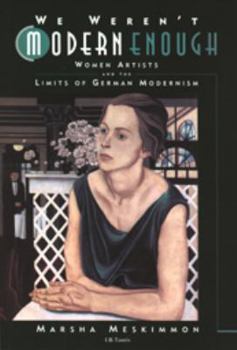We Weren't Modern Enough: Women Artists and the Limits of German Modernism Volume 25
(Book #25 in the Weimar and Now: German Cultural Criticism Series)
Select Format
Select Condition 
Book Overview
Marsha Meskimmon furnishes a fresh perspective on the art of women in the Weimar Republic and in the process reclaims the lost history of a number of artists who have not received adequate attention--not only because they were women but also because they continued to align themselves with the modes of realistic representation the Expressionists regarded as reactionary. Reconsidering the traditional definitions of German modernism and its central issues...
Format:Paperback
Language:English
ISBN:0520221346
ISBN13:9780520221345
Release Date:October 1999
Publisher:University of California Press
Length:263 Pages
Weight:0.10 lbs.
Dimensions:0.9" x 5.9" x 8.9"
Customer Reviews
1 rating
Forgotten History
Published by Thriftbooks.com User , 24 years ago
The years between the two World Wars in Germany were marked by a degree of turmoil in the nation's politics, economics and culture that was unprecedented at the time and remains unmatched to this day in the rest of Western European and American history. Unlike the 1960s, when social movements took place against a background of affluence, the rampant inflation and unemployment of the Weimar Republic meant there was no security whatsoever to counterbalance the tremendous changes penetrating to every corner of society. Everything which had once been fixed and solid became fluid and insubstantial; in Marx's words,"All that is solid melts into air". Gender roles in particular, which until that time had been enshrined as a kind of divine division of labour, were transformed from institutions into issues. Language lagged behind the pace of change: thus, that new breed of woman who cut her hair, played sport, took a job and followed fashion was simply called "die neue Frau". Similarly, the name garçonne was borrowed from French to describe the androgynous young city-dweller who made no secret of her bi- or homosexuality. The garçonne and the "neue Frau",while not strictly new in the sense of never having existed before, did attain a new level of visibility in public life and the mass media in the 1920s and 1930s. More often than not, they existed in combination with, rather than opposition to, traditional roles such as the mother, the Hausfrau and the prostitute. In Marsha Meskimmon's book We Weren't Modern Enough: Women Artists and The Limits of German Modernism, she explores the ways in which women perpetuated, refigured and fought against roles both old and new. Women artists occupied a unique position in the Weimar era. The nature of their work - painting or drawing in a studio, not employed as a sales assistant in a shop or a labourer in a factory - placed them at the borders between public and private, bourgeois and proletarian. While this ambiguity gave them more freedom to occupy numerous identities (wife, artist, mother) simultaneously, it also made their status more tenuous. Those married to male artists were sometimes able to negotiate an egalitarian partnership, but more often than not wives were overshadowed by their husbands and, in the case of Marta Hegemann and Anton Räderscheidt, sometimes even abandoned by them. As many of the women artists Meskimmon discusses were politically active - they were generally committed Socialists or Communists - their work featured realistic scenes of unemployment lines and hungry children gazing into gleaming shop windows, as well as satirical family portraits which mocked the bourgeois ideal of domesticity. Realism was not considered avant-garde in the 1920s and 1930s, however, and their work was classified as "women's art": hence painter Gerta Overbeck's lament that lends the book its title, "We weren't modern enough". During their lifetimes, many women artists supp






